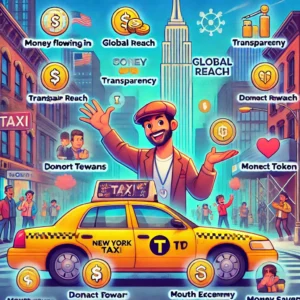Smart Contracts and Decentralized Applications (dApps)
Smart Contracts
 A smart contract is a self-executing contract with the terms of the agreement directly written into code. Unlike traditional contracts, which require intermediaries like lawyers or banks to enforce them, smart contracts automatically execute and enforce themselves when predefined conditions are met. These contracts run on blockchain networks, ensuring transparency, security, and immutability.
A smart contract is a self-executing contract with the terms of the agreement directly written into code. Unlike traditional contracts, which require intermediaries like lawyers or banks to enforce them, smart contracts automatically execute and enforce themselves when predefined conditions are met. These contracts run on blockchain networks, ensuring transparency, security, and immutability.
How Smart Contracts Work
-
Code-Based Logic: A smart contract operates using “if-then” statements. For example, “If person A sends 5 ETH to person B, then release access to the digital product.” Once the conditions in the code are satisfied, the contract automatically executes.
-
Immutable and Trustless: Smart contracts are stored on the blockchain, meaning once they are deployed, they cannot be altered or tampered with. This immutability ensures that the contract’s terms are followed exactly as written, without needing to trust a central authority.
-
Automation: Smart contracts automate processes, reducing the need for intermediaries and minimizing human error. This makes transactions faster, cheaper, and more efficient.
Role in Blockchain-Based Automation
Smart contracts are essential to the automation of blockchain networks, enabling decentralized finance (DeFi), gaming, supply chain management, and more. By removing intermediaries and allowing code to enforce agreements, smart contracts have revolutionized how businesses and individuals interact on blockchain platforms.
Example: In decentralized finance, smart contracts can be used to automatically manage loans. If a borrower fails to repay the loan by the due date, the smart contract can automatically transfer collateral to the lender without the need for legal action.
Decentralized Applications (dApps)
Decentralized Applications (dApps) are software applications that run on a blockchain, rather than on centralized servers. Unlike traditional apps, which rely on a single server to function, dApps operate on decentralized networks like Ethereum, allowing them to be more secure, transparent, and resistant to censorship.
How dApps Work
-
Built on Blockchain: dApps use smart contracts on blockchain platforms like Ethereum, Binance Smart Chain, or Solana to execute their backend operations. The front end of a dApp, which users interact with, is similar to traditional web or mobile apps.
-
Decentralization: dApps do not rely on a central entity to operate. Instead, they leverage blockchain technology and are powered by a decentralized network of computers (nodes) to ensure that no single party controls the app.
Key Use Cases for dApps
-
Decentralized Finance (DeFi): dApps are central to the DeFi movement, where users can lend, borrow, trade, and earn interest on cryptocurrencies without needing a bank or financial institution. Platforms like Uniswap (for decentralized exchanges) and Aave (for lending and borrowing) are leading examples of DeFi dApps.
-
Gaming: Blockchain-based games use dApps to give players full ownership of in-game assets, represented as NFTs (Non-Fungible Tokens). Games like Axie Infinity allow players to collect, breed, and trade virtual creatures, and these assets can be sold for real-world value.
-
NFT Marketplaces: dApps like OpenSea and Rarible serve as decentralized platforms for buying, selling, and trading NFTs, giving artists, creators, and collectors a transparent and secure way to transact without intermediaries.
-
Supply Chain Management: dApps can be used to track the movement of goods in a supply chain, ensuring transparency, authenticity, and reducing fraud. By using blockchain, companies can verify the origin and condition of products at every stage.
-
Voting and Governance: dApps also enable decentralized voting and governance systems, allowing users to participate in decision-making processes without the need for centralized authorities. DAOs (Decentralized Autonomous Organizations) rely on dApps to facilitate transparent, secure voting on proposals.
Benefits of dApps
-
Security: dApps are generally more secure than traditional apps since they operate on blockchain networks that are resistant to hacking and censorship.
-
Transparency: Because dApps operate on open-source blockchains, anyone can verify the code, ensuring transparency and trust in how the application operates.
-
Censorship Resistance: Since no single entity controls a dApp, it is more resistant to censorship and interference by governments or corporations.
Example: A decentralized exchange (DEX) like Uniswap is a dApp that allows users to trade cryptocurrencies directly from their wallets without needing to create an account or trust a third party. Trades are executed automatically by smart contracts, and users retain control of their funds at all times.
Conclusion
Smart contracts and decentralized applications (dApps) are at the core of blockchain innovation, transforming industries from finance to gaming. Smart contracts enable automated, secure, and transparent agreements, while dApps decentralize services, making them more accessible, transparent, and resilient. These technologies are driving the shift from centralized control to decentralized systems, opening up new possibilities for how businesses and users interact.
